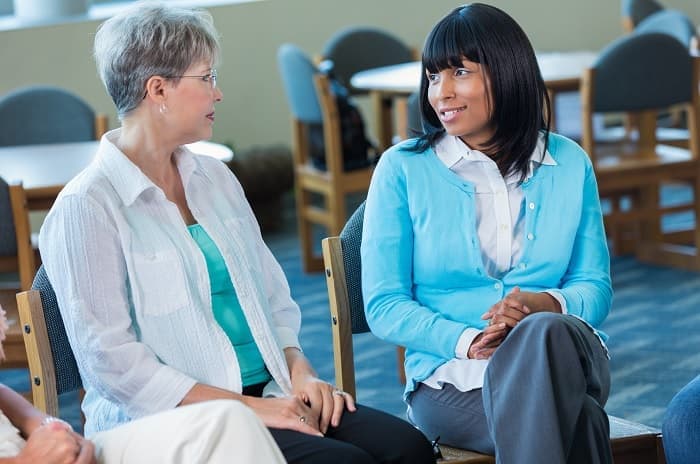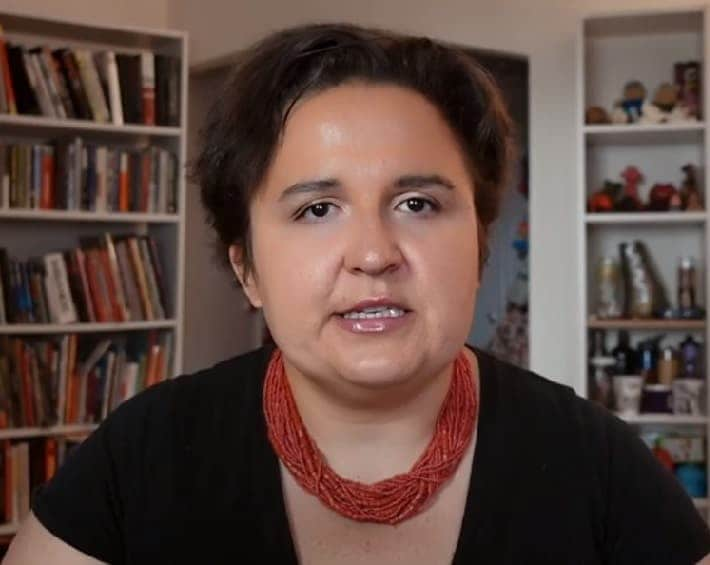How to Cope with Your Feelings

Many people with cancer join support groups so they can talk with others who have been through similar experiences.
Talk About It—Even When It’s Hard
You may feel uncomfortable talking about mental health and your struggles. Family members or friends may not want talk about it. It may go against your cultural beliefs, or you may feel you should be “strong” or “brave” and keep it to yourself. No matter the reason, it’s important to understand that sharing what you’re going through mentally is just as important to your health as sharing how you feel physically.
It’s OK to Reach Out for Help
Get in Touch with a Doctor or Specialist
Every feeling you have is real and valid. Talking to experts is very important, because mental health problems can get worse if they are ignored.
Your doctor and other health care providers—such as nurses, social workers, or patient navigators—can match you with a specialist who can help you address your concerns through different types of talk and behavioral therapy, relaxation techniques, medication, and referrals to support groups. Talking with people who may have had similar experiences can help you feel less alone, give you different perspectives, and help you learn how others have dealt with the same challenges.
Questions to Ask Your Doctor
- Does my medicine cause any mental or emotional side effects?
- Is what I’m feeling common? How can I deal with these feelings?
- Is counseling or a support group right for me?
Find Specialists and Resources

“Through counseling and just reaching out to different young adult organizations, I was able to create a new normal,” says Xenia, who survived uterine and endometrial cancers. “As a cancer survivor, you have to find the people that understand you, support you, get you.”
A variety of professionals can help you manage your feelings, address the issues you’re facing, and take advantage of resources in your community, including—
- Psychologists, clinical social workers, and counselors are trained mental health specialists who are licensed by the state to diagnose and treat mental health problems. They can help you manage your feelings and concerns. Many of these professionals, such as oncology social workers, specialize in working with people who are facing cancer.
- Psychiatrists are medical doctors who specialize in psychology or mental health. In addition to providing different therapies, they can also prescribe medications.
- Faith or spiritual counselors can help you cope with concerns such as feeling alone, fearing death, searching for meaning, and having doubts about your faith.
If you seek help from a specialist, make sure you find one you feel comfortable with and who can help you address the issues you’re facing. At your first meeting, ask questions like—
- What are your credentials, training, and experiences? Do you have a specialty? Do you have experience helping people who have faced problems like mine?
- How have you helped people who have faced these issues in the past?
- How long have you been practicing? And specifically, how long have you been helping people with similar problems?
- What approach will you take to help me? Do you practice a particular type of therapy?
- How often do you generally meet with clients (weekly? every other week?) and for how many weeks, months, or years?
- How will you check my progress against my goals for therapy? What will happen if I don’t start to feel better?
- Is medication an option? Is so, how will you coordinate prescriptions if you’re not licensed to prescribe medications?
Support Groups and Other Programs
Ask your health care team or local community centers, clinics, or places of worship about programs they may offer. Some hospitals, clinics, and support organizations offer special classes or cancer-specific support groups. Many advocacy organizations also offer support groups that meet in person and online.
- Cancer support groups: These groups bring together people who have or had cancer to talk about how they’re feeling.
- Family support groups: Your whole family may want to be involved in the healing process. In these programs, you and your family members take part in therapy sessions with trained specialists to help you talk about problems, learn about each other’s needs, and find answers.
- Stress management programs: These programs teach ways to relax and take more control over stress. Hospitals, clinics, and local cancer organizations may offer these programs and classes.
If you can’t find a program in your area, look into alternatives to in-person support, such as virtual support groups and therapy by telephone, video, or text.
- The National Cancer Institute explains what cancer support groups are and how to find one in your area.
- The American Cancer Society offers support services and programs for people with cancer in a variety of situations.
- The Cancer Support Community offers free support and counseling for cancer patients and their loved ones. It also connects cancer patients and caregivers with friends and family online.
- CancerCare provides support to help you cope with emotional, practical, and financial concerns.
- The Association of Oncology Social Work connects patients with oncology social workers in their area.
- The Cancer Hope Network connects patients with trained volunteers who have had similar cancer experiences.
- The National Institute of Mental Health provides resources and information on mental health, specialists, and research.